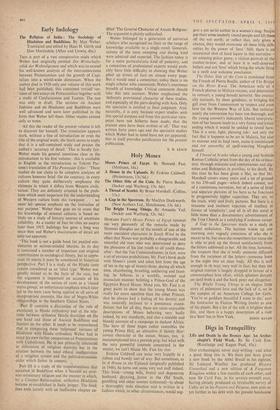Early Indology
The Religion of India : The Sociology of Hinduism and Buddhism. By Max Weber. Translated and edited by Hans H. Gerth and Don Martindale. (Allen and Unwin, 46s.) THIS is part of a vast comparative study which Weber had originally entitled Die Wirtschafts- ethik der Welireligionen and which was to extend
his well-known analysis of the interconnections between Protestantism and the growth of Capi- talism into a world-wide dimension. When the
author died in 1920 only one volume of this work had been published; this contained revised ver- ' sions of two essays on Protestantism together with a study of Confucianism and Taoism. The rest
was only in draft. The sections on Ancient Judaism and on Hinduism and Buddhism were well advanced and were later published in the form that Weber left them. Other studies existed only as notes.
All this the reader of the present volume is left to discover for himself. The translation appears stark, without a line of introduction or even the title of the original work; the blurb seems to imply that it is a self-contained study and praises the author's 'accuracy of detail.' This is hardly fair.
Weber made his general intentions clear in the introduction to his first volume : .this is available in English as the introduction to Talcott Par-
sons's translation of The Protestant Ethic: 'These studies do not claim to be complete analyses of
cultures however brief. On the contrary, in every culture they quite deliberately emphasise the elements in which it differs from Western civili- sation. They are definitely oriented to the prob- lem's which seem important for the understanding
of Western culture from this viewpoint . . . we
must lay special emphasis on the limitation of our purpose.' Weber then goes on to stress that his knowledge of oriental cultures is based en- tirely on a study of literary sources of uncertain reliability. As a matter of fact he cites no source later than 1915. Indology has gone a long way since then and Weber's inaccuracies of detail are Only too apparent.
'This book is not a guide book for puzzled mis- sionaries or serious-minded tdurists. In its day it contained a number of important and original contributions to sociological theory, but to appre- ciate its merits it must be considered in historical perspective. Part I is a study of the Hindu caste system considered as an 'ideal type.' Weber was greatly misled as to the facts. of the case, but the argument is important on account of his
development of the notion of caste as a 'closed .status group,' an unfortunate emphasis which later 19d to the term caste being applied to all sorts of
inappropriate contexts, like that of Negro-White relationships in the Southern United States.
Part II contains a discussion of the role of asceticism in Hindu orthodoxy 'and of the rela- tions between orthodox Hindu doctrines on the one hand and those of Ancient Buddhism and Jainism on the other. It needs to be remembered that in comparing these 'reformed' versions of Hinduism with Hindu orthodoxy Weber had in mind his own earlier comparison of Protestantism with Catholicism. He is not primarily interested in differences of religious doctrine but in the relation between the total ethical configuration of a religious system and the politico-economic order which forms its context.
Part III is a study of the transformations that occurred in Buddhism when it became an over- seas missionary religion and the manner in which, by a Counter-Reformation, orthodox Hinduism became re-established in India proper. The book then ends lamely with an ineffective chapter en- titled 'The General Character of Asiatic Religion.' The argument is plainly unfinished.
Weber belonged to a generation of universal scholars who recognised no limit to the range of knowledge available to a single mind. Generali- sations of the most sweeping and daring kind were admired and expected. The fashion today is for a more particularistic kind of pedantry, and a committee of professional experts would prob- ably have little difficulty in showing that Weber piled up errors of fact on almost every page. But it would need a committee; today there is no single scholar who commands Weber's enormous breadth of knowledge. Critical comments should take this into account. Weber emphasised the 'definitely provisional character of these studies, and especially of the parts dealing with Asia. Only the specialist is entitled to final judgment. And, naturally, it is only because expert studies with this special purpose and from this particular view- point have not hitherto been made, that the present ones have been written at all.' That was written forty years ago and the specialist studies which Weber had in mind have not yet appeared; that in itself provides justification for the present publication.
E. R. LEACH


































 Previous page
Previous page